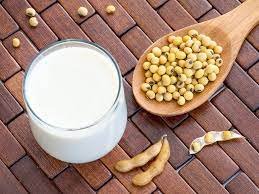In the realm of nutrition, few topics stir as much debate and controversy as soy products. Among them, soy milk often finds itself under scrutiny, especially concerning its potential impact on men’s health. With conflicting information circulating online and in various media, it’s crucial to delve into the scientific evidence to determine whether soy milk deserves its questionable reputation or is soy milk bad for men by it’s unfairly maligned.
Understanding Soy Milk: Soy milk, a plant-based alternative to traditional dairy milk, is derived from soybeans. It has gained popularity among those seeking lactose-free or vegan options and boasts various health benefits. Rich in protein, vitamins, and minerals, soy milk offers a nutritious alternative for individuals with dietary restrictions or preferences.
The Debate Surrounding Soy and Men’s Health: One of the primary concerns is that is soy milk bad for men and regarding soy milk it revolves around its phytoestrogen content, specifically isoflavones. Phytoestrogens are plant compounds that structurally resemble estrogen, a hormone predominantly associated with female physiology. This structural similarity has sparked concerns about potential feminizing effects on men who consume soy products regularly.
However, the relationship between soy consumption and its purported negative effects on men’s health is far from straightforward. While some studies suggest potential adverse effects, others indicate neutral or even beneficial outcomes. To navigate this complexity, it’s essential to explore key areas of men’s health that are often scrutinized in relation to soy consumption.
Addressing Testosterone Levels: Testosterone, a primary male sex hormone, plays a crucial role in various aspects of men’s health, including muscle mass, bone density, and libido. Concerns have been raised that phytoestrogens in soy could interfere with testosterone production or activity, potentially leading to adverse effects on male reproductive health.
However, a comprehensive review published in the journal Fertility and Sterility concluded that soy consumption does not significantly affect testosterone levels in men. Additionally, a meta-analysis of clinical trials found no adverse effects of soy on testosterone levels or other markers of male reproductive function.
Prostate Health Considerations: Another area of concern is the potential impact of soy on prostate health, particularly regarding the risk of prostate cancer. Prostate cancer is one of the most prevalent cancers among men, prompting researchers to investigate dietary factors that may influence its development.
Contrary to popular belief, emerging evidence suggests that soy consumption may actually be associated with a reduced risk of prostate cancer. The isoflavones found in soy possess antioxidant and anti-inflammatory properties, which may contribute to this protective effect. Furthermore, observational studies in Asian populations, where soy consumption is higher, have consistently shown lower rates of prostate cancer compared to Western countries.
Heart Health Benefits: Beyond concerns specific to male physiology, soy milk offers potential benefits for overall cardiovascular health. Numerous studies have demonstrated that soy protein, present in soy milk, can help lower cholesterol levels, reduce blood pressure, and improve endothelial function.
Moreover, the American Heart Association recognizes soy products as part of a heart-healthy diet, citing their ability to lower LDL cholesterol levels when consumed as part of a diet low in saturated fat and cholesterol.
Navigating Soy Consumption: While the evidence suggests that soy milk is not inherently detrimental to men’s health, moderation and context are key factors to consider. Like any food or beverage, excessive consumption of soy milk may lead to imbalances or adverse effects, especially if it displaces other nutrient-rich foods from the diet.
Individuals with specific health concerns or conditions should consult healthcare professionals for personalized guidance. Additionally, opting for organic or non-GMO soy products can minimize potential exposure to pesticides and other contaminants.
In conclusion, the notion that saying is soy milk bad for men is not true due to lacks substantial support of scientific research and findings. While concerns regarding phytoestrogens persist, the evidence suggests that moderate soy consumption is unlikely to have adverse effects on testosterone levels or male reproductive health.
Moreover, soy milk offers a range of nutritional benefits and may contribute to heart health and cancer prevention. As with any dietary choice, balance and moderation are essential, and individuals should base their decisions on the best available evidence and individual health considerations. So, pour yourself a glass of soy milk with confidence, knowing that it can be a part of a healthy and balanced diet for all.
Thanks for visiting Gymbag4u.com
You may also love reading our following articles. Coconut Milk: Uses and Benefits – GymBag4U and The Superfood Smoothie: Acai, Banana, and Almond Milk – (gymbag4u.com) and % Butter milk health benefits and recipe (gymbag4u.com) and Milk A “Complete Food” – Milk A “Complete Food” (gymbag4u.com)
